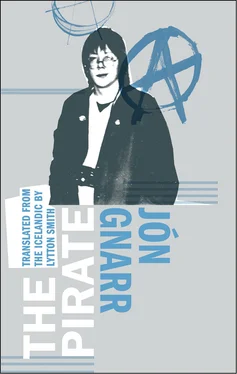I was never aware of Mom or Dad expressing grief. I’d never seen them cry from grief. Perhaps they’d both seen so much sorrow over the years that they’d stopped being affected by it. Maybe they were just mourning in their own way. Mom would be silent and reflective. She’d sit and listen to the radio, chain-smoking. She was quite the tough cookie. She didn’t wear her emotions on her sleeve — she always tried to take life’s shocks with equanimity. Dad just got even weirder than normal. He’d seen and experienced so much unpleasant stuff at work for the police. For example, he’d come across dead people who had either killed themselves or been murdered. He was repeatedly the first man on the scene after a terrible accident or fracas. He sometimes told me about it. Once, he told me about a time he went looking for a man who’d been up in the mountains in winter. Because of the roads and the weather, they didn’t find him until spring. When Dad found him, finally, ravens had eaten his face. The poor man completely lacked ears, eyes, and a mouth. Dad also told me about a friend of his, another police officer, who was locked in an isolation unit with an insane man. Dad was supposed to relieve him and take the next shift, but when he arrived, the psychotic had beaten his friend and colleague to death. Dad had been struck by the silence that met him when he arrived at work, and felt it was odd. He’d expected to hear the men talking. When he didn’t hear anything at all from inside the cell, he called his colleague’s name but got no response. When he went into the cell, he found the miserable spectacle of his friend lying dead on the floor, covered in blood, and the psychotic guy sitting motionless on the bed. Dad often told me stories like that from work. I had no idea, though, why he told them to me. They didn’t have a moral or message. Dad never felt the need to talk to anyone about the terrible things he’d experienced at work — he simply said that he was always able to forget. But he never did forget those experiences. Perhaps he believed he’d put them behind him, but no: the events remained vivid for him.
Grandma’s funeral was great. It was her farewell ceremony. She was finally dead. I didn’t feel the need to cry or to hug anyone. I was distant and distracted. I thought it all just made perfect sense. Grandma hadn’t been a bit apprehensive of dying. She’d frequently talked about it with me. She believed in God and believed she was going to meet Jesus when she died. I seriously doubted that. Why would God get involved with a person after death given that he hadn’t while they were alive? Wouldn’t it make more sense if he was kind to my grandmother while she was living? If Jesus was going to meet her, why not while she was alive? And since God had made Grandma blind, why hadn’t Jesus healed her? He could have. The whole time, Jesus could have gone to the Gufudalur region. He could have taken some earth from the ridge, mixed it into a paste with his spit, and rubbed it in Grandma’s eyes. I don’t understand the purpose of Jesus meeting someone once they’re dead. Grandma’s hardly going to be blind when she’s dead. For me, once you die, you disappear. Like a candle flame that’s been put out. You simply no longer exist. There’s nothing terrible about it. It doesn’t matter. Being dead is no different from not yet existing. There is nothing more mournful about being dead than about not having been alive during the Middle Ages. Grandma’s asleep and has no knowledge of herself. I don’t believe in God.
I don’t know Mom and Dad’s families at all well. I recognized Mom’s sisters. Dad’s family I was even less familiar with than Mom’s. His family was also much weirder than hers. Mom’s relatives were normal. My dad’s family have marked peculiarities. Some of those at the funeral were his siblings. I looked at many of them, but recognized no one. The truth was I had no idea what most of these people were called, and even less what they did. Some were cops or prison guards; others were criminals. I didn’t know who was just a friend and who was a relative. There was one man, for instance, who I thought was my father’s brother, but who turned out to be just a good friend of his from the Barðaströnd Association. I met these people so rarely, at best once or twice a year. Mom rarely took me to family gatherings when I was little. I was usually stuck in childcare since you couldn’t possibly bring me along: I was naughty, a prankster. Mom couldn’t even sit down for a cigarette if I was there. She always needed to be running after me; she couldn’t let me out of her sight. When I was a kid, I simply did everything I thought of: breaking lots of windows, setting things on fire, climbing on roofs and throwing stuff off them.
All funerals are the same. First, you sing: pitifully sad and annoying songs about flowers. Then the priest talks about the corpse’s life, though you know he has no idea what the dead body got up to while it was alive: he’s just reading something the deceased’s family wrote for him. Still, he talks like he knew the person in question well, telling everyone how entertaining and wonderful the corpse was when it was alive. Ashes to ashes, dust to dust. Then there’s a sad song about Jesus that makes lots of people cry. When the coffin is carried out, people stand up and follow it. Some cry a lot, so others put their arms around them and comfort them; everyone follows together at a distance behind the coffin, which gets put inside a hearse that drives to the cemetery for the burial. Once people are done crying, they have a cigarette and sniff loudly. Some people go to the cemetery, but others go straight to the reception and start drinking toasts. It’s always the same. When I die, I’m not going to have any songs. No sad hymns and not any bull about Jesus.
It was fun when we went to parties that involved Mom’s family. There was lots of laughing and storytelling. Everyone smoked and drank wine. Dad’s family was another matter. Those gatherings were quieter. People were just silent, then perhaps someone in the group would awkwardly say: “Yes, indeed, like you say.” If people started talking about anything, the discussions were mainly about jobs, even if there wasn’t much to say. The most lively discussions happened about things that had been in the news. That revived everyone. Especially if it meant talking politics. They were all strident in their agreement or disagreement, and many of them got a bit overexcited.
A few days later, a small van came from the old people’s home with Grandma’s worldly possessions. Everything was put into her old room. A chest of drawers, a rocker, and her personal effects were thrown into two cardboard boxes. When Mom and Dad were out, I snuck into the room and rummaged through the stuff. In the chest of drawers I found a bunch of things. I opened the drawers and grubbed around, examining old photographs and postcards she’d received from people. I didn’t know anyone in the pictures. They were old and black-and-white. Everyone looked serious, no one smiled. Judging from the pictures, back in the old days all men wore suits and all women wore the national dress. Grandma had also collected containers. The drawers were full of iron tins that had once held candy, wooden boxes that had held cigars, empty chocolate boxes with pretty pictures on the front. In the tins, my grandmother kept small objects: figures, coins, pictures, letters, and all kinds of crap like keys, broken jewelry, thimbles, and sewing stuff. I recognized some of the tins, remembering them from when Grandma lived with us.
I also found an envelope containing money. A lot of money. To me, at least. I took some and put it in my pocket. Grandma had no need of it anymore — she definitely would have been willing to give it to me. She didn’t need the money. I, however, needed it to buy cigarettes and LPs.
Читать дальше











